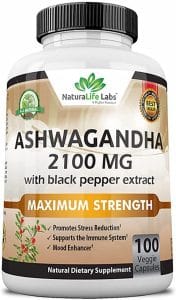Ashwagandha Pros and Cons
For thousands of years, Ashwagandha has been used in traditional Ayurvedic therapy. It has been promoted as a natural cure for several health concerns due to its capacity to assist the body manage with stress, worry, and exhaustion. But, like every supplement or treatment, ashwagandha has advantages and disadvantages. In this post, we’ll look at the pros and cons of using ashwagandha.

Botanical Name: Withania Somnifera
Classification: Adaptogen
Buy Now: Click Here
Ashwagandha, commonly known as Withania somnifera, is a famous Ayurveda herb used for centuries to treat various health problems. It is classed as an adaptogen, which means it can assist the body in dealing with stress and maintaining homeostasis.
Uses of Ashwagandha
- Fertility: Ashwagandha has been shown to improve male fertility by increasing sperm count, motility, and quality.
- Anxiety and stress reduction: Ashwagandha has been shown to reduce symptoms of anxiety and stress by lowering cortisol levels.
- Memory enhancement: Ashwagandha has been shown to improve general memory and cognitive function.
- Anti-inflammatory: Ashwagandha has been shown to reduce swelling and lower C-reactive proteins.
- Blood pressure and sugar control: Ashwagandha has been shown to lower blood pressure and blood sugar levels.
- Immune system booster: Ashwagandha has been shown to enhance the body’s natural and adaptive immune function.
- Muscle growth and strength: Ashwagandha has been shown to enhance muscle growth and strength.
Dosage and Administration

The most typical way to take Ashwagandha is orally, however, it can also be given topically. The following are some typical doses for various health conditions:
- To lower cortisol levels: 225-600 mg for 1-2 months.
- To reduce anxiety and improve sleep: 600 mg per day for 8 weeks.
- To reduce blood sugar levels: 250 mg to 3 grams equally divided dose per day.
- For male infertility and sperm quality: 5 gm per day for 3 months.
- To enhance muscle growth and strength: 500 mg per day for 12 weeks, or 150-1250 mg per day for 30 days.
- To improve immune function: 60 mg per day for 1 month.
- To reduce C-reactive proteins: 250-500 mg per day for 1-2 months.
- To improve general memory: 300 mg per day of Ashwagandha root extract for 8 weeks.
Common Adverse Effects Ashwagandha:
- Drowsiness
- Nausea and vomiting
- Diarrhea
- Skin rash
Ashwagandha may have different side effects for males and females.
Side effects of Ashwagandha for males:
- Increased serum testosterone levels: Ashwagandha may increase serum testosterone levels, which can be harmful to males with hormone-sensitive prostate cancer. It may worsen their condition.
- Gynecomastia: Ashwagandha may cause breast enlargement in males due to its estrogen-like effects.
- Changes in libido: Ashwagandha may affect male libido by either increasing or decreasing it.
- Changes in sperm count: Ashwagandha may affect sperm count and quality, although studies have shown mixed results.
Side effects of Ashwagandha for females:
- Hormonal effects: Ashwagandha may affect female hormones, leading to changes in menstrual cycles.
- Pregnancy and breast-feeding: Ashwagandha may affect fetal development and milk production, so pregnant and breastfeeding women should avoid it.
- Gastrointestinal effects: Ashwagandha may cause nausea, vomiting, and diarrhea in some females.
- Skin rash: Ashwagandha may cause skin rash in some females.
Contraindications
- Because ashwagandha can raise serum testosterone levels, it is not recommended for persons with prostate cancer because it can exacerbate the illness.
- Ashwagandha should be avoided by pregnant and lactating women because it may interfere with fetal development and milk production.
- Ashwagandha should be avoided by people who have hyperthyroidism or autoimmune disorders such as multiple sclerosis, systemic lupus erythematosus, and rheumatoid arthritis since it may worsen their condition.
- Before taking Ashwagandha, anyone who is taking sedatives, immunosuppressants, thyroid hormones, antidiabetic medications, or antihypertensive drugs should check with their healthcare professional.
Ashwagandha Pros and Cons
Pros of Ashwagandha
- Helps reduce stress and anxiety: Ashwagandha has been shown to reduce cortisol levels, which is a hormone that is released in response to stress. Lower cortisol levels can help reduce stress and anxiety.
- May help improve brain function: Studies have suggested that ashwagandha may help improve memory, reaction time, and other cognitive functions.
- May help lower cholesterol and blood sugar levels: Some studies have suggested that ashwagandha may help reduce cholesterol and blood sugar levels in people with diabetes.
- May help improve muscle strength and endurance: Some research has suggested that ashwagandha may help improve muscle strength and endurance, making it a popular supplement among athletes and bodybuilders.
- May have anti-inflammatory properties: Ashwagandha contains compounds that have been shown to have anti-inflammatory effects, which may help reduce inflammation throughout the body.
Cons of Ashwagandha:
- May cause gastrointestinal issues: Some people may experience upset stomach, diarrhea, or vomiting when taking ashwagandha.
- May interact with certain medications: Ashwagandha may interact with certain medications, such as thyroid hormone replacement therapy or medications for anxiety and depression.
- May lower blood pressure: Ashwagandha has been shown to have a mild hypotensive effect, which may lower blood pressure. People who already have low blood pressure or are taking medications for high blood pressure should use caution when taking ashwagandha.
- May cause allergic reactions: Although rare, some people may experience an allergic reaction to ashwagandha.
- May not be safe during pregnancy: Ashwagandha should be avoided during pregnancy as it may have uterine-stimulating effects.
Ashwagandha Pros and Cons Summary
| Pros of Ashwagandha | Cons of Ashwagandha |
|---|---|
| Helps reduce stress and anxiety | May cause gastrointestinal issues |
| May help improve brain function | May interact with certain medications |
| May help lower cholesterol and blood sugar levels | May lower blood pressure |
| May help improve muscle strength and endurance | May cause allergic reactions |
| May have anti-inflammatory properties | May not be safe during pregnancy |
It is important to note that the pros and cons of Ashwagandha may vary from person to person, and the dosage and duration of use may also impact its effects.
Nursing Responsibilities
- Before providing Ashwagandha, nurses should review the patient’s medical history and existing medications.
- Nurses should keep an eye on the patient for signs of sleepiness, nausea, vomiting, diarrhea, and skin rash.
- Nurses should educate the patient about Ashwagandha dosage and administration.
- If a patient is taking Ashwagandha, nurses should keep track of their vital signs, blood pressure, and blood sugar levels.
FAQs
Q1. What is Ashwagandha?
Answer: Ashwagandha is a medicinal herb that has been used in Ayurvedic medicine for centuries to improve overall health and well-being.
Q2. What are some of the benefits of Ashwagandha?
Answer: Some of the benefits associated with Ashwagandha include reducing stress and anxiety, improving brain function, lowering cholesterol and blood sugar levels, and enhancing muscle strength and endurance.
Q3. Can Ashwagandha help improve memory and cognitive function?
Answer: Yes, several studies have suggested that Ashwagandha can help improve memory and cognitive function. The herb contains compounds that have been shown to promote the growth of nerve cells, leading to better brain function.
Q4. Are there any side effects associated with taking Ashwagandha?
Answer: While Ashwagandha is generally considered safe, some people may experience side effects such as upset stomach, diarrhea, or vomiting. Additionally, the herb may interact with certain medications and should be avoided by pregnant and breastfeeding women.
Q5. How should Ashwagandha be taken?
Answer: Ashwagandha can be taken orally in the form of capsules, powders, or teas. The recommended dosage varies depending on the desired effect, and it is important to consult with a healthcare provider before starting a new supplement regimen.
References
- Chandrasekhar, K., Kapoor, J., & Anishetty, S. (2012). A prospective, randomized double-blind, placebo-controlled study of safety and efficacy of a high-concentration full-spectrum extract of ashwagandha root in reducing stress and anxiety in adults. Indian Journal of Psychological Medicine, 34(3), 255–262. https://doi.org/10.4103/0253-7176.106022
- Choudhary, D., Bhattacharyya, S., & Bose, S. (2017). Efficacy and safety of ashwagandha (Withania somnifera) root extract in improving memory and cognitive functions. Journal of Dietary Supplements, 14(6), 599–612. https://doi.org/10.1080/19390211.2017.1284970
- Mishra, L.-C., Singh, B. B., & Dagenais, S. (2000). Scientific basis for the therapeutic use of Withania somnifera (ashwagandha): A review. Alternative Medicine Review, 5(4), 334–346. PMID: 10956379
- Wankhede, S., Langade, D., Joshi, K., Sinha, S. R., & Bhattacharyya, S. (2015). Examining the effect of Withania somnifera supplementation on muscle strength and recovery: A randomized controlled trial. Journal of the International Society of Sports Nutrition, 12, 43. https://doi.org/10.1186/s12970-015-0104-9
- Kulkarni, R. R., Patki, P. S., Jog, V. P., Gandage, S. G., & Patwardhan, B. (1991). Treatment of osteoarthritis with a herbomineral formulation: A double-blind, placebo-controlled, cross-over study. Journal of Ethnopharmacology, 33(1-2), 91–95. https://doi.org/10.1016/0378-8741(91)90148-y
- Pratte, M. A., Nanavati, K. B., Young, V., & Morley, C. P. (2014). An alternative treatment for anxiety: A systematic review of human trial results reported for the Ayurvedic herb ashwagandha (Withania somnifera). Journal of Alternative and Complementary Medicine, 20(12), 901–908. https://doi.org/10.1089/acm.2014.0177
- Chandrasekhar, K., Kapoor, J., & Anishetty, S. (2013). A prospective, randomized double-blind, placebo-controlled study of safety and efficacy of a high-concentration full-spectrum extract of ashwagandha root in reducing stress and anxiety in adults. Indian Journal of Psychological Medicine, 34(3), 255–262. https://doi.org/10.4103/0253-7176.106022
- Sharma, A. K., Basu, I., & Singh, S. (2018). Efficacy and safety of ashwagandha root extract in subclinical hypothyroid patients: A double-blind, randomized placebo-controlled trial. Journal of Alternative and Complementary Medicine, 24(3), 243–248. https://doi.org/10.1089/acm.2017.0183
- Tips for Getting Better Sleep with Anxiety in 2024
- Split Renal Test: The Best Way to Diagnose Dangerous Kidney Problems in 2024
- Revolutionizing Treatment-Resistant Schizophrenia Solutions: Unleashing Hope in 2024
- Demystifying Obsessive-Compulsive Disorder in 2024: Understanding OCD from the Inside Out
- Unmasking the Mind: Can the DAP Test Truly Decode Your Mind in 2023?